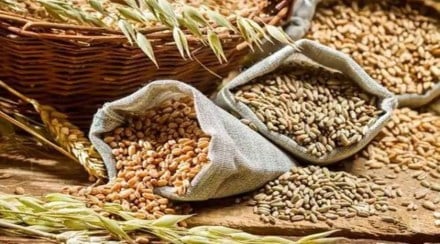The Food Corporation of India (FCI) has again started to take large amounts as short-term loans and wage and means advances from banks for financing its operations. The corporation has been relatively comfortable with the cash position over the last one year as the government promptly released the food subsidy amounts to it, after the practice of NSSF loans for subsidy financing was stopped in FY22 Budget for the sake of transparency of government finances.
The FCI is resorting to short-term loans again because the fiscal constraint has slowed release of subsidy to FCI.
Sources told FE that against demand of around Rs 85,000 crore towards the expenses for April-May, 2022, FCI has been provided with only around Rs 25,000 crore so far. To bridge the gap, it has taken short-term loans of around Rs 25,000 crore, sources said. Wheat procurement takes place mostly in these two months.
The finance ministry has provided Rs 10,000 crore as wage and means advance to FCI, the rest is being financed through short-term loans.
FCI is mandated to avail short-term loans which are of 90 days duration from scheduled banks to address cash flow mismatches. These short-term loans carry an interest rate in the range of 3.85-3.9% per annum.
Wage and means advances are released during the year and repayable out of the subsidy allocation for the year towards the end of the current financial year.
Official sources said that in coming months the government is expected to provide adequate financing for FCI, through which more than 70% of the government’s food subsidy budget is routed.
Due to a huge mismatch between rising expenses because of open-ended procurement of rice and wheat under minimum support price (MSP) operations from farmers and cost of carrying excess stocks, between 2016-17 to 2020-21, the government had provided it funds from loans taken from National Small Saving Funds (NSSF) during 2016-17 to 2020-21 in lieu of food subsidy.
However, finance minister Nirmala Sitharaman in her Budget speech for 2021-22 had announced ending the practice of extra-budgetary borrowing from next fiscal by making provisions of Rs 3.35 trillion towards payment of NSSF loans.
The central issue prices of Rs 3, Rs 2, Rs 1 for a kg of rice, wheat and coarse grains under the National Food Security Act (NFSA) have not been revised since 2013. On the other hand, FCI’s economic cost (MSP to farmers, storage, transportation and other costs) of rice and wheat for 2022-23 is Rs 36.70 and Rs 25.88 per kg, respectively.
FCI procures and distributes more than 60 million tonne (MT) of wheat and rice annually. The corporation manages procurement, storage and transportation of rice and wheat to states for distribution, mainly for the NFSA and other welfare schemes.
For 2022-23, the central government has allocated Rs 2.06 trillion for food subsidy expenses out of which Rs 1.45 trillion or 71% is provided to FCI. However, following the extension of Pradhan Mantri Garib Kalyan Anna Yojana, an additional Rs 0.8 trillion will be spent under food subsidy.
Currently, FCI relies on meeting its working capital loans through bonds, ways and means advances, and short-term loans.
More than 800 million people get highly subsidised 5-kg foodgrains per head per month under the NFSA. This includes around 25 milion Antyodaya Anna Yojana households, which constitute the poorest of the poor. They are entitled to 35 kg per household per month at subsidised prices.
